Related Research Articles

Galla Placidia, daughter of the Roman emperor Theodosius I, was regent to Valentinian III from 423 until his majority in 437, and a major force in Roman politics for most of her life. She was queen consort to Ataulf, king of the Visigoths from 414 until his death in 415, and briefly empress consort to Constantius III in 421.
The 400s decade ran from January 1, 400, to December 31, 409.
The 430s decade ran from January 1, 430, to December 31, 439.

Year 430 (CDXXX) was a common year starting on Wednesday of the Julian calendar. At the time, it was known as the Year of the Consulship of Theodosius and Valentinianus. The denomination 430 for this year has been used since the early medieval period, when the Anno Domini calendar era became the prevalent method in Europe for naming years.
The 420s decade ran from January 1, 420, to December 31, 429.
Year 431 (CDXXXI) was a common year starting on Thursday of the Julian calendar. At the time, it was known as the Year of the Consulship of Bassus and Antiochus. The denomination 431 for this year has been used since the early medieval period, when the Anno Domini calendar era became the prevalent method in Europe for naming years.
The 450s decade ran from January 1, 450, to December 31, 459.
The 390s decade ran from January 1, 390, to December 31, 399
The 440s decade ran from January 1, 440, to December 31, 449.
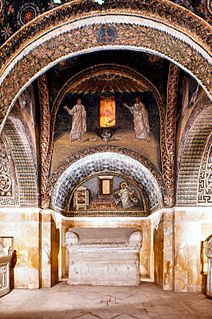
Year 425 (CDXXV) was a common year starting on Thursday of the Julian calendar. At the time, it was known as the Year of the Consulship of Theodosius and Valentinianus. The denomination 425 for this year has been used since the early medieval period, when the Anno Domini calendar era became the prevalent method in Europe for naming years.

Julius Nepos was de jure and de facto Roman emperor of the West from 474 to 475 and then only de jure until his death in 480. Born to a distinguished family, he succeeded his uncle, Marcellinus, as military governor of the province of Dalmatia in 468. With support of the Eastern Empire, Nepos overthrew his predecessor Glycerius without a fight and proclaimed himself western emperor in June 474. Orestes, the Magister Militum, turned his forces on Nepos in August 475, forcing him to flee by ship to Dalmatia. Orestes crowned his son Romulus as Emperor in Nepos's absence, but neither the Eastern Emperor Zeno nor many Western provinces recognized Romulus, regarding him as a usurper. Nepos never relinquished his imperial title and sought a compromise with the barbarian king Odoacer who deposed Romulus. Odoacer ambiguously recognized his claim but refused him any role in government outside of Dalmatia. Nepos was assassinated in 480 while plotting his own restoration, and Zeno formally abolished the Western division of the Empire.
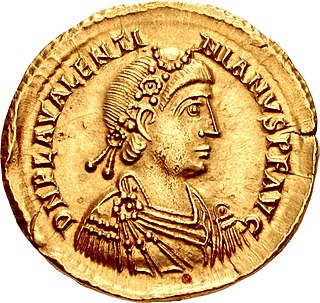
Valentinian III was Roman emperor of the West from 425 to 455. His reign was marked by the ongoing collapse of the Western Empire.

Flavius Aetius was a Roman general of the closing period of the Western Roman Empire. He was an able military commander and the most influential man in the Western Roman Empire for two decades (433–454). He managed policy in regard to the attacks of barbarian federates settled throughout the Western Roman Empire. Notably, he mustered a large Roman and allied (foederati) army to stop the Huns in the Battle of the Catalaunian Plains, ending the devastating Hunnic invasion of Attila in 451, though another devastating invasion of the Huns occurred in the year after that.
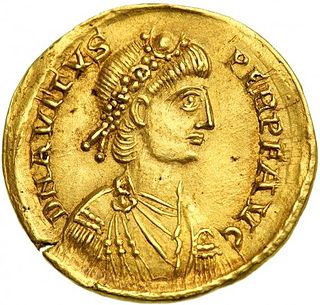
Eparchius Avitus was Roman emperor of the West from July 455 to October 456. He was a senator of Gallic extraction and a high-ranking officer both in the civil and military administration, as well as Bishop of Piacenza.
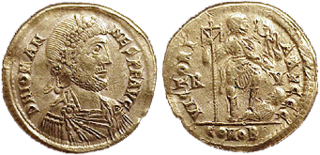
Joannes or John was a Roman usurper (423–425) against Valentinian III.
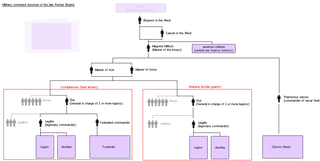
Magister militum was a top-level military command used in the later Roman Empire, dating from the reign of Constantine the Great. The term referred to the senior military officer of the Empire. In Greek sources, the term is translated either as strategos or as stratelates.

Petronius Maximus was Roman emperor of the West for two and a half months in 455. A wealthy senator and a prominent aristocrat, he was instrumental in the murders of the Western Roman magister militum, Aëtius, and the Western Roman emperor, Valentinian III.
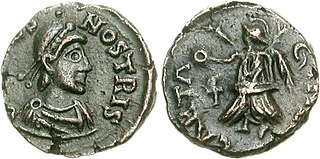
ComesBonifatius was a Roman general and governor of the Diocese of Africa. He campaigned against the Visigoths in Roman Gaul and the Vandals in Roman North Africa. An ally of Galla Placidia, Bonifacius engaged in Roman civil wars on her behalf against the generals Flavius Felix in 427-429 and Flavius Aetius in 432. Although he defeated the latter at the Battle of Rimini, Bonifacius suffered a fatal wound and was succeeded by his son-in-law Sebastianus as patricius of the Western Roman Empire.
Flavius Sigisvultus was a general of the late Western Roman Empire.
References
- 1 2 3 J. R. Martindale (1980), The Prosopography of the Later Roman Empire, Cambridge: Cambridge University Press, Vol. 2, pp. 493-494.
- ↑ Thomas J. Craughwell, How the Barbarian Invasions Shaped the Modern World, Fair Winds, 2008, p.60 Google book
- ↑ Joseph Cummins, The War Chronicles: From Chariots to Flintlocks, Fair Winds, 2008 p. 110 Google book
- ↑ Augustine of Hippo, City of God, Book 18, chapter 54 (Available at CCEL)
| This ancient Roman biographical article is a stub. You can help Wikipedia by expanding it. |